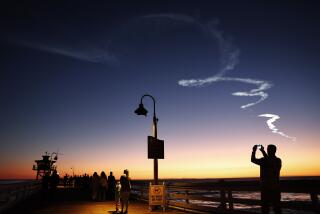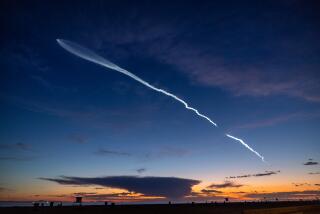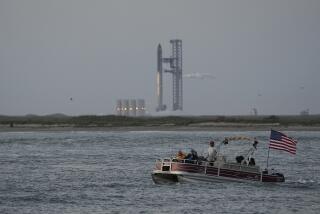With a successful second powered flight, Virgin Galactic could take paying customers to space in a year
Less than two months after the first rocket-powered test flight of its suborbital spaceplane, Richard Branson’s Virgin Galactic on Tuesday completed another test and moved closer to its goal of regular tourist flights into space.
A four-engine craft with twin booms lifted off from the Mojave Air and Space Port around 8:40 a.m., carrying the VSS Unity spaceplane under its belly. The Unity separated cleanly from the larger aircraft about an hour later, and its two pilots ignited the spaceplane’s rocket motor for 31 seconds.
The spaceplane reached a speed of Mach 1.9 and hit an altitude of 114,500 feet, higher than the altitude it reached during a previous test flight in April.
That April flight was the first powered test since a 2014 fatal accident that destroyed the company’s previous SpaceShipTwo spaceplane. The National Transportation Safety Board later found that the accident was caused by premature deployment of the spaceplane’s feathering system, which is designed to help the vehicle reenter Earth’s atmosphere. Virgin Galactic has said it created a mechanism on the new plane to prevent its feather system from opening too early.
Branson said in a phone interview after the flight test that the spaceplane ended up going faster and higher than expected. Virgin Galactic added seats and other equipment to the spaceplane to shift the vehicle’s center of gravity to more closely mimic what it will be like to have passengers aboard during commercial service.
“It was as good as it gets today,” he said. “We’ve all got big smiles on our faces.”
Assuming all post-flight tests go well, Virgin Galactic could conduct its next flight test in six weeks, Branson said. That test will have a longer, potentially 40-second burn of the spaceplane’s rocket motor.
Quicker vehicle turnaround is an important part of Mojave-based Virgin Galactic’s plans for commercial service. Eventually, the company hopes to reduce turnaround time between flights to about four days, Branson said.
In an interview with BBC Radio 4 posted Saturday, Branson said his company, along with competitor space firm Blue Origin, could carry paying passengers into space within 12 months. Virgin Galactic is charging $250,000 for a ticket.
The British billionaire estimated that there would be three to four more test flights before he embarked on his own spaceflight as a passenger on Virgin Galactic’s first commercial flight.
“I would be disappointed if I haven’t been in space before the end of the year,” he said.
Branson said Tuesday that he wanted the Virgin Galactic team to “get it right” and that the only race was “with ourselves,” as safety was the company’s main priority.
Twitter: @smasunaga







